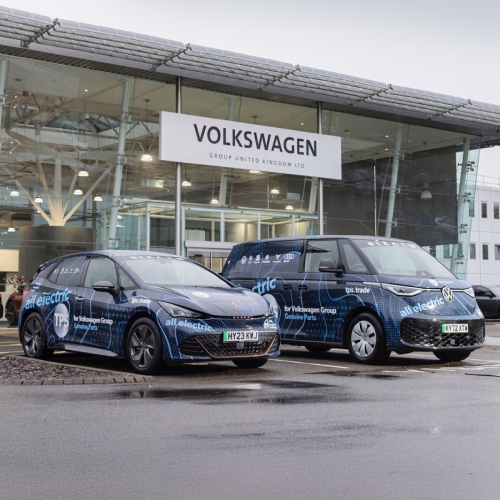Sustainability is not just about compliance; garages are increasingly viewing it as an opportunity to future-proof themselves and reduce running costs, Curtis Hutchinson reports.
Sustainability has been at the heart of the UK’s automotive sector for over two decades. It touches the way vehicles are designed and manufactured, the supply chain that supports the production process, vehicle distribution and, of course, the workshops that service and maintain the country’s ever expanding car and van parc.
The Society of Motor Manufacturers and Traders (SMMT) recently published its twentieth annual Sustainability Report revealing how the sector’s growth over the period has not been at the expense of the environment.
“The UK automotive sector is now one of the most efficient in Europe, outperforming the EU average for energy, CO2 and water. Thanks to strict efficiency targets and continuous improvement and refinement of manufacturing processes, the sector has significantly reduced its environmental impact,” said SMMT Chief Executive Mike Hawes.
These advances put the automotive sector in a good position to address the challenges presented by current and future legislation. In May 2019 the government declared a national climate emergency, setting an ambitious target of reaching net zero emissions by 2050. Clearly there is still plenty of work to be done in the sector.
The Volkswagen Group has long been managing the environmental sustainability of its operations across the UK. To help set its future direction it has been working closely with Simply Sustainable, a specialist sustainability consultancy which helps companies, across different sectors, develop and implement best practice strategies.
“The Volkswagen Group sees reducing it's carbon footprint as an operational and commercial priority, as well as a significant opportunity,” said Alasdair Marks, Simply Sustainable’s Director.
“Operationally the group is working hard to reduce its environmental impact across its business and value chain, an approach which often translates into bottom line savings through reduced inefficiencies and wastage.
“Commercially their vision is quite clear; to become the role model for the environment, safety and integrity, as part of 'shaping mobility - for generations to come" he said.
Consequently the group is working hard to raise sustainability levels in workshops run by its franchised partners, with many of these best practices addressing universal aspirations across the servicing and repair sector.
Marks acknowledges the challenge for smaller businesses is how to address the sustainability issues relevant to their operations, while making a difference without becoming a burden on time and resources.
“The key for any business, large or small, is to start associating sustainability with both efficiency and cost savings, that will help drive processes. Too often sustainability is viewed as a cost to the business rather than a benefit,” he said.
Marks believes garages need to focus on their biggest cost centres, especially energy, and start identifying where they are seeing the most waste.
“There are simple audits that garages can do to conserve energy and resources. These range from checking machines are not being left on when they are not in use, especially overnight, to identifying where heat loss is occurring. Some easy wins can be achieved through changing people’s behaviour in the workplace. This is why it is important to get buy-in from staff from the outset as they will help drive change.”
Marks recommends garages monitor their energy bills to see if any changes they introduce start to make a difference in usage as that will help validate the decisions they have made and drive further progress.
He also suggests garages review their energy providers.
“We always recommend that businesses consider switching to a renewable energy tariff, it can make a big difference. There is a perception that renewable energy can be more expensive but that’s increasingly not the case as prices have come down significantly in recent years, making switching an easy win.”
Marks also advises garages to review their waste management processes.
“Waste is a big issue for garages and workshops. Businesses need to know where their waste is ending up by reviewing their waste streams and considering how anything that is going to landfill can be reused or recycled instead,” he said.
Finally, any sustainability plans being considered now need to be viewed as part of a long term process aimed at future-proofing businesses, especially as electric vehicles become more popular and will require attention in independent as well as franchised workshops.
“Garages need to start looking long term and consider what their businesses will look like in 10 to 15 years time and start to build in longevity and resilience into achieving sustainability especially as electrification becomes more prevalent.”
Sustainability best practices
Dealers and garages have been adopting various measures to reduce their carbon footprint in light of environmental concerns and to reduce operating costs in the long term.
Stephen Latham, Head of Operations at the National Franchised Dealers Association (NFDA), outlines his best practice advice businesses need to consider to achieve greater sustainability.
Mains power
Some power companies are advising businesses of pulling down electricity at more economical times via metering services rather than the normal 3pm to 7pm prime electric usage period. LED lighting is also increasingly being used to reduce energy consumption.
Heating
Heating of facilities, particularly in workshops, has always been expensive primarily due to the amount of wastage caused by shutter doors frequently opening and closing. This is often addressed by setting disciplines and using automatic electric detectors which can help reduce heating power.
Packaging
Packaging, predominantly of spare parts, has always been an environmental issue and although many manufacturers have reduced the quantity of packaging, smart recycling benefits both garages and the environment.
Electric charge points
The government will soon make it mandatory for all workplaces with more than 20 parking spaces to have an electric charge point. Having charge points at the workplace has been proven to significantly support the uptake of EVs and, as a result, encourage greener commutes.
Curtis Hutchinson is a motoring journalist and former editor of Motor Trader and Company Car.




